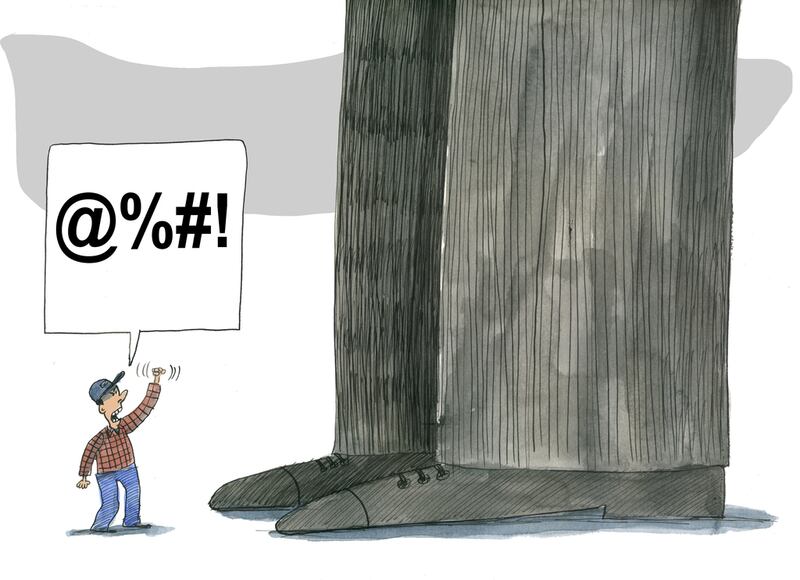I'm sitting in a plane watching Money Monster as I write. I am upset. No, not because of the acting - although Clooney leaves me wanting - but because - well, dammit, I'm upset. With the world order. With companies hiding behind what is legally permissible and jargon. With us, the little person, losing out time after time after time.
For those who don't know, the film deals with corporate greed and manipulation - enabled by the interconnected invisible strands of our global web - that serve to strangle us, the little people, while concealing perpetrators.
A tad dramatic you might think - my take on it that is - but no, it is not. Because for me, it's about major loss when we, the people, want to hold the big boys accountable, decipher some document, get real answers to questions, discover facts, claim or reclaim our own money. I mourn both time and trust - gone. Forever.
A tweet I got a few days ago brings this message home. This from @Ian_Hainey:
My reply was to do lots of research and take back control. Because that's the thing, who can we trust?
Well, not big business.
Money Monster
's evil is personified in the chief executive of a newly listed company, Ibis, a rainmaker of a business that, having hit a series of home runs, lost its shareholders (many of them the general public) US$800 million. Just like that. Blaming it on an algorithm glitch that no one questioned, least of all the host of an all-American style stock-picking cheesy TV show cheerleader (Clooney).
But it's not just money is it? It's people's lives. Their savings, dreams, future well-being and present survival. This is embodied in Kyle. The man who lost everything. Poof.
It tips Kyle over the edge. And he wants answers.
While we in the UAE ponder how to word emails and letters, he takes a gun into the studio to hold people accountable.
The long and short is that the global web closed in on Mr Big Business, the chief executive of Ibis, and betrayed his immoral but legal actions in which he manipulated prices for potential gain. Except it didn't go his way - because of the human factor: a key player wouldn't be bribed.
Kyle wants the CEO to admit he was wrong. It takes some doing. Because Mr Big hides behind the standard: it is legal. Name one law I broke. A bit like us being told: you signed on the dotted line. Tough luck.
But it's wrong, says Kyle.
It's wrong, I say.
It's wrong, you say.
The CEO eventually conceded.
I cried at the end. I cried for Kyle. For people. For our life energy that's dismissed and gone forever - just because they have better lawyers and our money paying for it. Just because we sign on dotted lines. Just because we are doing our damnedest to make a better life for us, for our ripples of life - our children, families, passions.
As the summer kicked in, I wrote about the way the financial services companies behave. As expats we are more vulnerable, because there are fewer laws to protect us, less redress at hand. The articles resonated. A lot.
Funny how, as a result, the companies that propagate the "it's legal, we did our best, you signed on the dotted line" lines want meetings with me. What for? To explain to me - the idiot - how they do things, how above board they are, how they do a good job, present me with "happy customers".
No thank you. I am not interested in jargon, legalese or language and intellect being murdered by PR-ese. I am not interested in any more of my life's energy being squandered.
The fact is, these companies are on the take. That we, the people, do not, will not, do well.
Research shows that those who have saved via a pension fund are financially worse off than if they'd invested the money themselves. One reason packaged and investment products do so badly is their fees. This is why the European Commission is recommending EU regulators investigate the performance and fees of investment funds.
Personally I am rooting for Valdis Dombrovskis, Latvia's former prime minister, who currently holds the financial services brief in Brussels. He is asking for an industry-wide analysis of - get this: net returns after fees - for retail investment products. He wants to cut the jargon and get to the point. If there is anything you can do to help him, do it. Tweet, write a letter, send him positive energy.
We need more Dombrovskis - after all, we are all Kyle. Oh, and Clooney, I don't take to your acting much, but I'll have a Nespresso if you're offering.
Nima Abu Wardeh describes herself using three words: Person. Parent. Pupil. Each day she works out which one gets priority, sharing her journey on finding-nima.com.
pf@thenational.ae
Follow us on Twitter
[ @TheNationalPF ]





